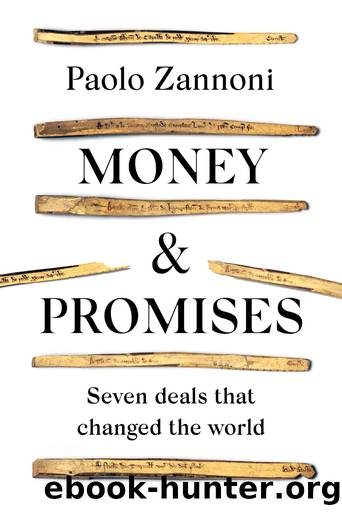Money and Promises by Paolo Zannoni

Author:Paolo Zannoni
Language: eng
Format: epub
ISBN: 9781804542781
Publisher: Bloomsbury Publishing Plc
Published: 2024-01-18T00:00:00+00:00
Exchange Fairs
Bills of exchange solved a lot of problems, but they also caused a lot of headaches. Clearing many debts due in many different places and at different times required all sorts of ad hoc processes and arrangements. In order to simplify matters, merchant bankers set up exchange fairs, which were regular gatherings of merchant bankers not only to trade goods, but also to clear bills of exchange. The first exchange fairs were held in the Champagne region, in the north east of the Kingdom of France, in the ancient towns of Troyes, Provins, Bar-sur-Aube, and Lagny.
We have lots of contemporary accounts of how these fairs worked. They were basically a co-operative venture between rulers and merchants: the counts of Champagne guaranteed the attendeesâ physical security and their equality before the law, and established a legal system for the enforcement of contracts and the protection of rights; and in exchange, the merchants contributed to the royal treasury and to the local economy.
The early exchange fairs were held a few times a year in Champagne according to a fixed schedule: the May fair was held in Provins, the âhot fairâ in June in Troyes, etc. Participants in the fairs bought and sold commodities such as silk, spices, leather and cloth, but mostly they were there to clear bills of exchange. The debts the merchants could not clear were settled with coins or re-issued to be dealt with at the next fair.
Over time, the fairs became rather more formalised, expanded and began to move around, first from Champagne to Bruges, and then to Cologne and Geneva, and by 1420 they had established themselves firmly in Lyon, the ancient capital of the Gauls and a well-established centre of trade in luxury goods. Merchant bankers had long since realised that they could profit more, and more easily, from trading bills of exchange than trading luxury goods. Lyon became not just a centre for commodities trading, a market for goods, but a true financial centre, a market for currency exchange.
And it was to Lyon that our old friend Benedetto di Gondola, the Ragusan merchant with his heavy-laden argosies, went to clear his debts.
Download
This site does not store any files on its server. We only index and link to content provided by other sites. Please contact the content providers to delete copyright contents if any and email us, we'll remove relevant links or contents immediately.
International Integration of the Brazilian Economy by Elias C. Grivoyannis(111057)
The Radium Girls by Kate Moore(12027)
Turbulence by E. J. Noyes(8047)
Nudge - Improving Decisions about Health, Wealth, and Happiness by Thaler Sunstein(7706)
The Black Swan by Nassim Nicholas Taleb(7128)
Rich Dad Poor Dad by Robert T. Kiyosaki(6632)
Pioneering Portfolio Management by David F. Swensen(6300)
Man-made Catastrophes and Risk Information Concealment by Dmitry Chernov & Didier Sornette(6019)
Zero to One by Peter Thiel(5801)
Secrecy World by Jake Bernstein(4752)
Millionaire: The Philanderer, Gambler, and Duelist Who Invented Modern Finance by Janet Gleeson(4478)
The Age of Surveillance Capitalism by Shoshana Zuboff(4291)
Skin in the Game by Nassim Nicholas Taleb(4248)
The Money Culture by Michael Lewis(4207)
Bullshit Jobs by David Graeber(4190)
Skin in the Game: Hidden Asymmetries in Daily Life by Nassim Nicholas Taleb(4004)
The Dhandho Investor by Mohnish Pabrai(3764)
The Wisdom of Finance by Mihir Desai(3746)
Blockchain Basics by Daniel Drescher(3581)
